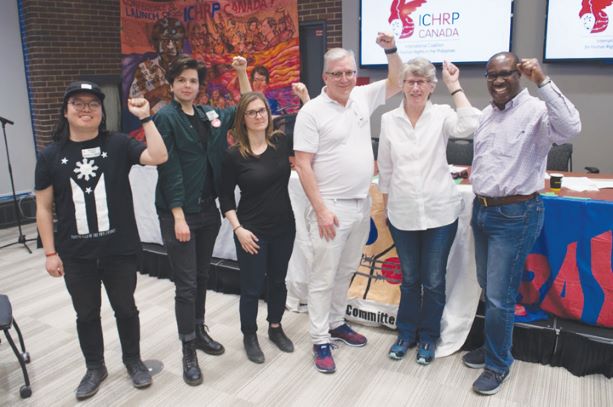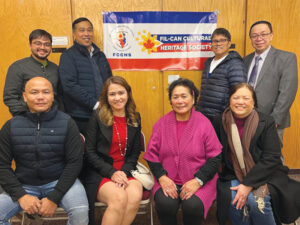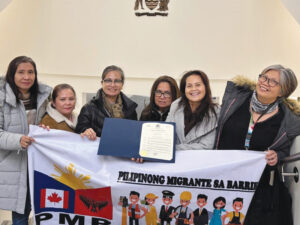The saying “an injustice to one is an injustice to all” is very true. I am old enough to know the many injustices in various parts of the world, in the past and now, like the bombings of Vietnamese villages by American airplanes during the Vietnam War, the apartheid laws and attacks against blacks in South Africa, the forced disappearances of civilians and critics against Pinochet in Chile, the suicides of farmers in India, the cases of murdered and missing indigenous women in Canada, the extra-judicial killings in the Philippines, and the displacement of Filipino peasants and indigenous communities. These affect all of us, wherever we are. We are all so interconnected globally and individually and we wage battle against the same forms of oppression and exploitation.
Last May 11 and 12, over 100 community leaders from cities across Canada came together in Ottawa to launch a cross-country human rights campaign and form the Canadian chapter of the International Coalition for Human Rights in the Philippines (ICHRP). ICHRP-Canada vowed to “strengthen our solidarity with counterparts on the ground in the Philippines” and to “exert more effective pressure on both the Canadian and Philippine governments to respect human rights in the Philippines.”
These are “troubled times for human rights in the Philippines” and while mainstream media ignores or fails to cover what is happening thousands of miles away in a small archipelago in southeast Asia, concerned groups and individuals from cities across Canada have made it their solidarity duty to know and take action as part of a coalition.
A significant part of that coalition work will include lobbying and reminding the Canadian government and people of its relationship with the Philippines, more so when the Filipino community is the third largest visible immigrant community in Canada. We note that in its November 2018 report, the Standing Committee on Foreign Affairs and International Trade of the Canadian House of Commons recommended that Canada needed to reimagine its relationship with the Philippines in the context of growing authoritarianism. In plain English, that would mean review Canadian ties in the face of a fascist and misygonist tyrannical regime.
Duterte’s terrible human rights record pushed Canadian officials in 2018 to reconsider the sales of helicopters to Duterte, citing such a deal will abet humans rights violations by the Duterte government. The International People’s Tribunal (IPT) in 2018 found President Duterte guilty of crimes against the Filipino people, citing witness testimonies on human rights violations. This verdict was followed by the Philippine government’s withdrawal from the International Criminal Court in March 2019.
ICHRP-Canada elected a six (6)-person national coordinating committee composed of human rights and peace advocates, church leaders, academics and community leaders. They are: Rev. Patricia Lisson, Chairperson; Doug Booker, Secretary-General/Treasurer; Andy Tran, Regional Coordinator for Ontario; Dani Gay, Regional Coordinator for Quebec and Members-at-Large Whitney Haynes and Rev. Japhet Ndhlovu.
Canada-based solidarity groups over the years have called for freedom for political prisoners, demanded a stop to the killings and enforced disappearances, and raised concerns on the implications of Canadian foreign aid and investment in the Philippines. The formation of the ICHRP –Canada chapter raises international solidarity work on a higher level with a wider and bigger coalition of groups and individuals working as one to help defend the Philippines which is under siege from a tyrannical, fascist, misogynist President at the country’s helm. The Philippines is one of the worst places to be a journalist, a lawyer, a peasant, an indigenous person, a human rights defender. I dare to say, that it is one of the worst places to be poor because a poor person runs the risk of being gunned down on the street on the suspicion of using or peddling drugs.
Dani Gay, Quebec regional representative for ICHRP Canada, and a member of the Jeunes Socialistes pour le Pouvoir Populaire (JSPP) commented that “The war on drugs is a distraction from the social and economic problems plaguing the country. It’s really a war on the poor. It is taking drug addiction as a disease, as the fundamental problem and not as a symptom of an even bigger problem.”
The ICHRP-Canada launch featured Dr. Angie Gonzales, Global Coordinator of ICRHP, who shared how the international coalition began with the “Stop the Killings” platform, and human rights lawyer Edre Olalia of the National Union of Peoples’ Lawyers (NUPL) who gave an overview of the current Philippine human rights situation and the current government’s red-tagging and attacks against people’s lawyers.
Olalia said, “In the Philippines, if you’re not a Duterte supporter, you’re either a protector of drugs or a communist. If you criticize, if you resist, if you stand in their way, they will get you out of the way…We have to stand together amidst all the misery, amidst all the oppression, amidst all the tyranny. We have the truth! We have the people!”
Rev. Marma Urbano, who participated in forming the ICHRP-US Chapter, shared her personal story depicting the violence faced by community leaders and human rights defenders. Filipina fair trade activist Ruth Fe Salditos, whose own life is at risk, talked about unscrupulous landlords in Panay Island, central Philippines. Urbano and Salditos also conveyed a message of hope through the peace process in the midst of the civil war between the Government of the Philippines and the National Democratic Front of the Philippines (NDFP).
This hope was addressed at the launch by Coni Ledesma, member of the NDFP negotiating panel on the peace talks with the Philippine Government, who related the peace talk process to the call to defend human rights by addressing the roots of the armed conflict in the Philippines. “For the National Democratic Front of the Philippines, our vision is clear. We want and will continue to struggle for just and lasting peace. It is only when the deepest aspirations of the people are met: land for the landless, jobs, food, education and healthcare. That is, when national and social liberation is achieved would there be peace.”
Congratulations on the successful launch of the International Coalition for Human Rights in the Philippines – Canada Chapter!
Human Rights for All! Long Live International Solidarity! ###








